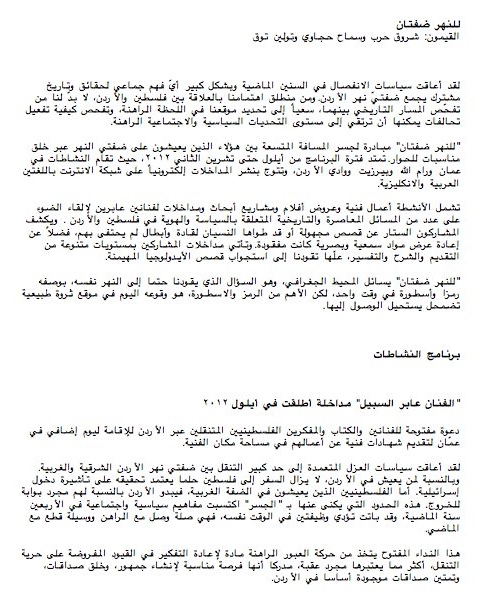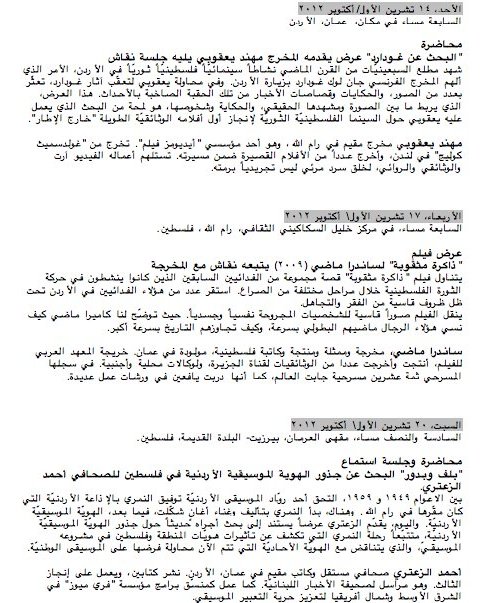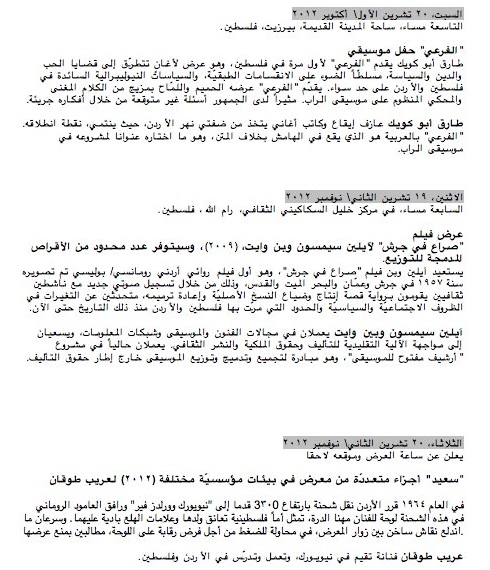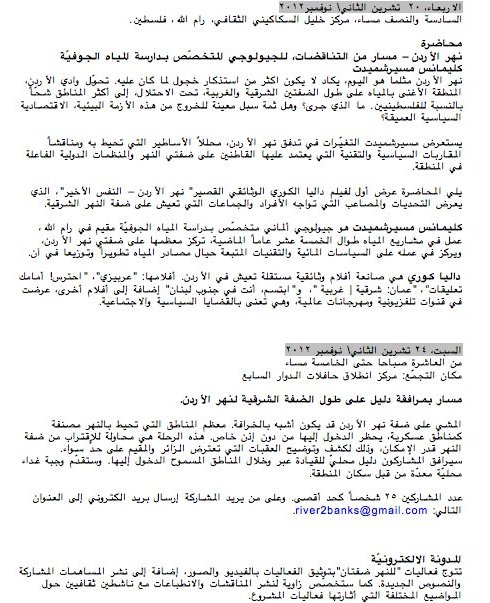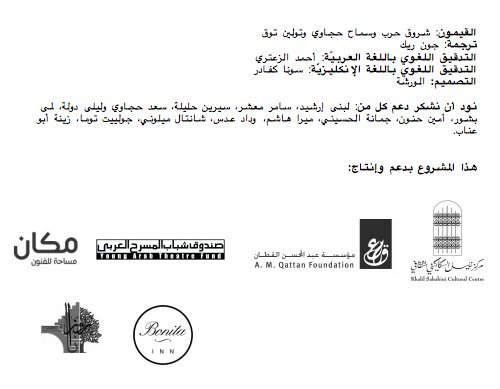The River has Two Banks
The politics of segregation has greatly hindered a collective understanding of shared realities and common histories across the east and west banks of the River Jordan. As individuals who are invested in the relationship between Palestine and Jordan, the historical trajectory of the two compels us to examine where we are now, and how we can build new alliances to overcome the social, economic, and political challenges of today.
The river has two banks is an initiative addressing the growing distance between those living on either side of the river by creating multiple occasions for discussions. The program unfolds over a time period starting in September and running until November 2012, across different locations in Amman, Ramallah, Birzeit and the Jordan Valley, and culminating in a bilingual Arabic/English online publication.
This series of connected events is made up of a showcase of artworks, film screenings, research projects, and traveling artist talks that explore different contemporary and historical aspects of Palestinian Jordanian identities and politics. The invited contributors reveal unexpected stories around leading figures, unappreciated heroes, and recovered audio-visual materials to create multi-layered interpretations that bring into question dominant ideological narratives.
The river has two banks examines the landscape that ultimately leads us to the river itself–both a symbol and a myth–which today, stands as a diminishing natural resource only a few of us have access to.
Program of Activities
“Traveling Artist Talks” an ongoing intervention launched in September 2012
An open call inviting Palestinian artists/writers/thinkers traveling via Jordan to stay for an additional night/day and deliver an artist talk about their work at Makan art space in Amman.
For those in Jordan, traveling to Palestine remains a dream that is determined/prevented by an Israeli visa. For Palestinians living in the West Bank, Jordan is only an exit point, a transient and temporary space. The border between the two, which is referred to as “the Bridge”, is vested with political and social connotations from the last 40 years, serving both as a connection in the present and a disconnection from the past.
This invitation takes advantage of existing traffic and proposes a new way to consider restrictions regarding mobility; rather than seeing it as an obstacle, perceiving it as an opportunity to address new audiences, make new friends, and cement existing friendships in Jordan.
Sunday, 14 October 2012
7:00 PM at Makan art space, Amman, Jordan
Research Presentation
Searching for Godard, by filmmaker Mohanad Yaqubi, followed by a moderated discussion
In the early 1970’s, a wave of new activist Palestinian cinema had been taking place in Jordan, inspiring the likes of the French filmmaker Jean-Luc Godard to join. As Yaqubi attempts to trace Godard’s footsteps, he stumbles across found footage, stories and news clips from a tumultuous time period. Connecting the image to the landscape, the story to its people, this presentation is a glimpse into Yaqubi`s ongoing research on Palestinian Revolutionary Cinema for his first feature documentary "Off-Frame."
Mohanad Yaqubi is one of the founders of Idioms Film, a filmmaker collective based in Ramallah. He graduated from Goldsmiths College in London and has directed several short films. His work stands between video art, documentary and fiction, creating a visual narrative that is not entirely abstract.
Wednesday, 17 October 2012
7:00 PM at Khalil Sakakini Cultural Center, Ramallah, Palestine
Film Screening
Perforated Memory, (2009), by Sandra Madi, followed by a discussion with the director
Perforated Memory tells the story of a group of ex-guerrillas (Fedayeen), who were active members in the Palestinian Revolution Movement during different stages of the struggle. Many of them have since settled in Jordan, where they suffer poverty and neglect. The film is a raw portrayal of physically and sometimes mentally wounded characters. Madi’s camera shows how these men have quickly forgotten their own heroic past, and how even quicker history has forgotten them.
Sandra Madi, born in Amman, is a Palestinian film director, actress, producer and writer. A graduate of the Arab Institute of Film, she has produced and directed several documentaries for Al Jazeera and local and international agencies. In theatre, she has twenty plays on record that have toured worldwide and engaged youth in training and improvisational workshops.
Saturday, 20 October 2012
6:30 PM at Arman Cafe, Birzeit old city, Palestine
Lecture & Listening Session
Round in circles - Looking for Jordan’s music identity in Palestine by music critic Ahmad Zatari
From 1949 to 1959, pioneering Jordanian musician Tawfiq Al Nimri joined the Jordanian radio station offices in Ramallah, where he started producing and composing work that came to define the genesis of Jordanian national music. In this newly commissioned research, Zatari follows Nimri`s journey, unpacking some of the complex transnational influences that informed his music and challenging the common enforcement of singular identity directions on nationalist and patriotic music production in Jordan today.
Ahmad Zatari is an independent journalist and writer based in Amman, Jordan. He has published two books, working on the third, and is a regular cultural correspondent for the Al-Akhbar newspaper. As a coordinator for "Freemuse," he also works on promoting freedom of expression in music in the Middle East and North Africa.
Saturday, 20 October 2012
9:00 PM at Birzeit Old City Square, Birzeit, Palestine
Concert
“El Far3i” Live in Concert
Tarek Abu Kweik presents “El Far3i” for the first time in Palestine, an acoustic set that moves between stories of love, religion, and politics, while protesting class divides and neo-liberal policies plaguing both Jordan and Palestine. A combination of melodic singing and spoken words that break into rap verses, “El Far3i” is an intimate and witty performance that teases audiences with unexpected questions and daring statements.
A percussionist and lyricist, Tarek Abu Kweik takes the banks of the River Jordan, his home, as his starting point. “El Far3i”–meaning "secondary" in Arabic– is a metaphor for a voice from the margins or sidelines, which gives his solo rap project its name.
Monday, 19 November 2012
7:00 PM at Khalil Sakakini Cultural Centre, Ramallah, Palestine
Film Screening
Struggle in Jerash, (2009), by Eileen Simpson and Ben White. A limited edition of the DVD be distributed at the event.
Struggle in Jerash (2009) re-animates Jordan`s first feature film that is now out of copyright. By creating a new soundtrack that moves between the original plot–a tale of thievery and romance filmed in 1957 across Jerash, Amman, Jerusalem, and the Dead Sea–and an engaging commentary by local practitioners who narrate the story of the production, loss, and eventual recovery of the original film wheels, all of which reflect on shifting modernities and national borders.
Eileen Simpson and Ben White work at the intersection of art, music and information networks, and seek to challenge conventional mechanisms for the authorship, ownership and distribution of culture. Their ongoing project Open Music Archive is an initiative to source, digitize, and distribute out-of-copyright sound recordings.
Tuesday, 20 November 2012
Time and location to be announced
Saeed, exhibition elements in various institutional settings, (2012)
In 1964, Jordan presented a thirty-foot high column at the New York World’s Fair. Also showcased at the fair was a painting by Mohanna Durra, of a Palestinian mother embracing her child in fear. Huge controversy broke out by fair visitors, lobbying the censorship of the painting, and demanding that the work be removed.
Oraib Toukan is an artist based in New York, she teaches and works in Jordan and Palestine.
Wednesday, 21 November 2012
6:30 PM at Khalil Sakakini Cultural Centre, Ramallah, Palestine
Lecture
The Jordan River–a stream of contradictions, by hydrogeologist Clemens Messerschmid
Today the Jordan River is merely a faint memory of its former self. Under occupation, the Jordan Valley, the water richest area of the entire east and west banks, has turned into the most water-stressed area for Palestinians. How did this come about and are there ways out of this deep social, environmental, economic and political crisis?
Messerschmid will present past and present flows of the Jordan River, untangle its myths and discuss present technical and political approaches by riparians and the international community.
The lecture will be preceded by the first screening of Dalia Al Kury’s short documentary “The River Jordan - the last breath” that chronicles the lives and hardships of some of the Jordanian inhabitants on the eastern banks of the river.
Clemens Messerschmid is a German hydrogeologist based in Ramallah, who has been working in water projects for the past fifteen years, mostly in Jordan River riparian states, focusing both on technical as well as hydro political issues of water resource development and allocation.
Dalia Al Kury is an independent documentary filmmaker living in Jordan. Her documentaries Arabizi, Amman: East vs. West, Caution! Comment ahead, and Smile, You’re in South Lebanon among others have screened on various TV channels and in international film festivals, portraying contemporary social and political issues.
Saturday, 24 November 2012
10:00 AM - 5:00 PM, meeting point at the 7th circle bus stop, Amman, Jordan
Hike
A daylong guided hike along the eastern bank of the River Jordan
To walk along the River Jordan is perhaps only a fantasy; most of the areas surrounding the river are designated as military zones and require special permits to enter. In an attempt to get as close to the river as possible, this trip aims to discover and illustrate the obstacles in the Jordan Valley area for visitors and inhabitants. A local guide will walk us through the permissible paths, and lunch will be arranged with the local community.
The trip is open to a maximum number of twenty-five participants. To register, please send an email to river2banks@gmail.com.
